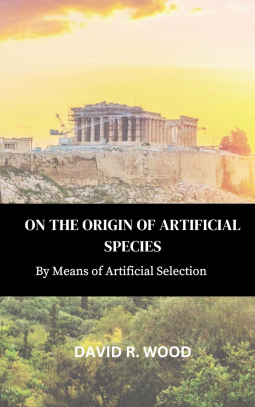
On the Origin of Artificial Species
By Means of Artificial Selection
by David R. Wood
This title was previously available on NetGalley and is now archived.
Send NetGalley books directly to your Kindle or Kindle app
1
To read on a Kindle or Kindle app, please add kindle@netgalley.com as an approved email address to receive files in your Amazon account. Click here for step-by-step instructions.
2
Also find your Kindle email address within your Amazon account, and enter it here.
Pub Date 23 Oct 2023 | Archive Date 25 Jan 2024
Talking about this book? Use #OntheOriginofArtificialSpecies #NetGalley. More hashtag tips!
Description
Charles Darwin’s natural theory of evolution is one of the greatest ideas in history. His theory enabled mankind to partially perceive the patterns in nature. However, the greater pattern has remained undiscovered until now. With the decoding of ancient Greek mythology and philosophy, the pattern of evolution has been fully revealed.
In his book On the Origins of Artificial Species, David R. Wood has completed the work begun by the ancient Greeks and progressed by the family Darwin. He has discovered the pattern of evolution – both natural and artificial. In so doing, David has produced scientific breakthroughs in the fields of evolution, neuroscience, philosophy, history, politics, business, warfare, and technology. This includes clarifying and defining what the emergence of artificial intelligence means in evolutionary terms.
These scientific breakthroughs allow humanity to understand our present and predict our future. They enable the framing of a clear choice for the future of artificial intelligence. The wrong choice will lead to our extinction. The right choice will take us to the stars.
Available Editions
| ISBN | 9798989395019 |
| PRICE | |
Available on NetGalley
Featured Reviews
On the Origins of Artificial Species unveils a groundbreaking exploration of evolution that goes beyond Charles Darwin's natural theory. Authored by David R. Wood, the book decodes ancient Greek mythology and philosophy to fully reveal the patterns of evolution, both natural and artificial. Wood's work spans across various fields, including evolution, neuroscience, philosophy, history, politics, business, warfare, and technology, offering scientific breakthroughs that redefine our understanding of the present and our ability to predict the future. What struck me most about this book is its capacity to clarify the implications of artificial intelligence in evolutionary terms. Reading On the Origins of Artificial Species felt like a mind-expanding journey, providing insights that extend far beyond the boundaries of conventional thought. It would be a great read for anyone fascinated by the intersection of science, philosophy, and the future of humanity.
Hold onto your hats, folks! On the Origins of Artificial Species is not your average book—it's a mind-bending rollercoaster that takes you on a journey through evolution like never before. David R. Wood is like the cool, rebellious cousin of Charles Darwin, shaking up the scientific scene with ancient Greek mythology and a fresh perspective. This book doesn't just stop at natural evolution; it dives into the world of artificial intelligence, blowing your mind with breakthroughs in evolution, neuroscience, and even throwing in some politics and technology for good measure. I mean, who knew evolution could be this cool? Wood's writing isn't just for the science nerds; it's for anyone who wants to peek into the future and figure out whether we're headed for extinction or interstellar adventures. Trust me, after reading this, you'll never look at evolution—or AI—the same way again.
Readers who liked this book also liked:
Dr. Karissa Thomas
Business, Leadership, Finance, Nonfiction (Adult), Professional & Technical
Babette Wilson
General Fiction (Adult), Mystery & Thrillers









